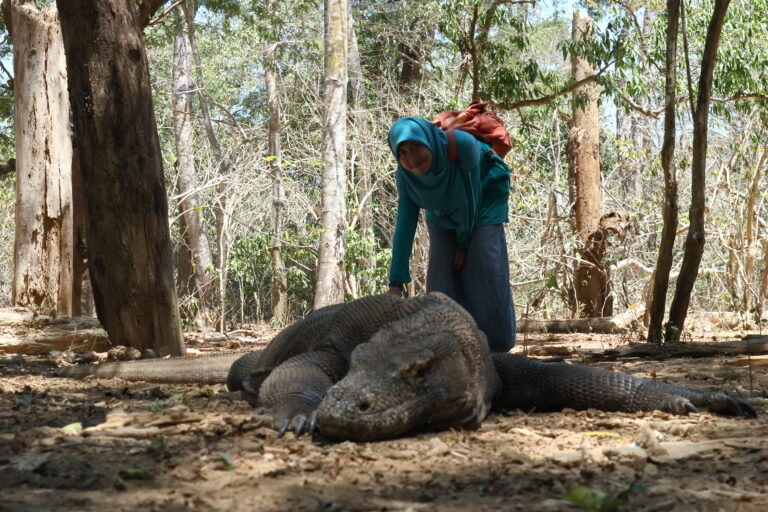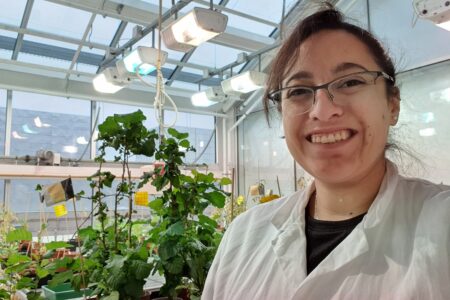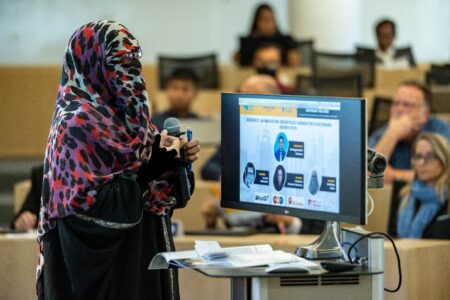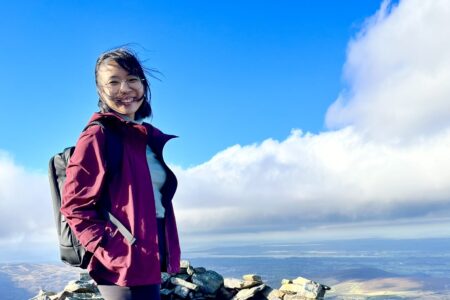
There are many ways to choose a university degree – some pick it based on their adolescent interest, others stumble upon it by luck and fall in love with the subject matter.
Mega Trishuta Pathiassana chose to pursue an environmental science degree because it was a major topic of interest worldwide. In particular, the use of natural resources is a big cause of conflict between countries and communities.
“It’s said that the fighting isn’t just about our perspectives and ideals, but about the different needs of the groups about the natural resources,” says Pathiassana. “I thought, oh, there’s a big need to understand the reasons behind the conflicts and how we can maintain our environment and natural resources. So why aren’t people going into this topic deeper?”

Environmental science enthusiast Pathiassana pictured during her undergraduate degree graduation at the University of Indonesia. Source: Mega Trishuta Pathiassana
What you can do with an environmental science degree
Taking this weighty goal upon herself, Pathiassana started her foray into the field of environmental science, first with a Bachelor of Economics, Natural Resources, and Environmental Economics from the University of Indonesia.
Graduating with that degree got her into the thick of things, namely a position as an Economics Junior Consultant at the Indonesia Investment Coordinating Board. There, she dealt with studying international cooperation and free trade on an investment and economics outlook project.
Pathiassana even had a chance to present a topic about the trading relations between the Korea International Trade Association representatives and her own board.
But she soon found herself looking for ways to better understand the world and the subject of environmental science.
“I already had plans made even before I graduated with my bachelor’s; I wanted to have other perspectives and experience from another country. Because sometimes it’s not enough to just stay in my country,” says Pathiassana. “
“I believed that if I studied abroad, I could learn something new and use that knowledge for my country, especially to develop the smaller communities in my area.”
Pathiassana’s has always wanted to go abroad.
As a child, she was inspired by a story she read about Marie Curie, the Polish-born French physicist famous for her work on radioactivity.
Not only was she the first woman to win a Nobel Prize, she was the first person to win a Nobel Prize twice, and the only person to win a Nobel Prize in two scientific fields.
“I dreamed of studying abroad in France because of that story,” shares Pathiassana.
It got to the point that during her first grade of junior high school, she would go to Internet cafes to look for scholarships to study abroad.
“At that time, it was really hard to have a good Internet connection, so I’d go to a computer cafe, the ones where you had to pay hourly, and try to look for study abroad scholarships online,” she says.
Pathiassana even called the British Council and its German equivalent to ask if they offered scholarships to recent high school graduates.
While she ultimately pursued her undergraduate degree locally, citing the lack of guidance, financial barriers, and a lack of confidence in her English language skills at that time, the dream to study abroad remained with her.

Pathiassana (first from the left), pictured with her classmates during their graduation from their master’s degree from Taiwan’s National Chung Hsing University. Source: Mega Trishuta Pathiassana
More degrees in environmental science
When she was older, wiser, and more experienced, Pathiassana began earnestly applying for international scholarships.
That is how the second chapter of her environmental science degree led her to Taiwan’s National Chung Hsing University – through the NCHU International Degree Seeking Scholarship Program in International Master Programme of Agriculture.
There, Pathiassana’s focus lay in horticulture and environmental science with a specialisation in environmental assessment of ecotourism.
Her thesis was titled “Environmental Impact Assessment of Community-based Ecotourism, A Case Study in Ruanbikeng Leisure Agricultural Area,” and she graduated summa cumlaude – the highest honour.
And that was just the halfway point of her journey with her environmental science degrees.

Pathiassana (first row, middle) pictured with her group mates for her diploma in Sweden. Source: Mega Trishuta Pathiassana
Next in line was a Diploma in Sustainable Inclusive and Resilient Cities, earned from Lund University in Sweden.
The year-long programme was conducted online and offline, allowing Pathiassana to explore a Scandinavian approach to her research interest.
From learning how environmental systems were managed to other natural resources, Pathiassana absorbed all the knowledge she could.
Better yet, she could apply what she learned through a Waste Minimisation project that she implemented at a project site in a village in West Nusa Tenggara Province, Indonesia, using black soldier flies.
The funny thing about it all? Pathiassana had almost missed the application deadline for signing up for the diploma.
During that time, she was busy as a lecturer in the Faculty of Agricultural Technology in Postharvest Technology and Agriculture Industrial Technology Study Programme at Sumbawa University of Technology.
“I was working on a project with my students related to organic waste management using the same insect as my Waste Minimisation project for my diploma,” she says.
“So I was really interested when I read the programme guidelines because I thought I could learn so much from being in Sweden.”
Pathiassana was hoping to get a grant to develop the Waste Minimisation project as well.
So, with nothing to lose and some goals in mind, Pathiassana applied for the fully funded scholarship just three days before the deadline, which she obtained in the end.
Now, Pathiassana is about to complete her PhD in Forest Environmental Science from Seoul National University, the country’s number one university, according to QS World University Rankings 2025.
Here, she is an awardee of not just one but two scholarships: the Graduate Scholarship for Excellent Foreign Student (GSFS) and the SNU President Fellowship (SPF) Programme.
Surprisingly, reaching the doctorate level wasn’t something Pathiassana had expected herself to achieve.
“Sometimes, I think it was a mistake to take a PhD – it’s so hard and difficult; I’m still struggling with my studies,” she says.
“But at the same time, I really love to study new things and gain new experiences. I feel lucky whenever that happens – that I get the chance to have these feelings.”
Whether it was about bacteria, microbes, or fungi, Pathiassana believes that her PhD studies have shown her more than all her previous studies did.
It was a deeper dive into topics that were previously just brushed over, making learning all the more enjoyable.

Environmental science graduate Pathiassana (seated, in blue) pictured with her students conducting a project about recycling. Source: Mega Trishuta Pathiassana
The power of an Environmental Science education to change the course of the future
Ultimately, all of her studies amass to one simple goal: to become someone beneficial to her community.
She’s done it before too – one of her projects involved creating organic pesticides for biocontrol and a type of fertiliser that allowed farmers to double – sometimes even triple – their harvest. All of this was done without charge as well.
So, it suffices to say that it’s a worthy goal, especially since Pathiassana had this planned out since she was a toddler growing up in a small village in Indonesia’s Central Java area with her grandmother.
“There were a lot of people in the village, and there weren’t a lot of good facilities,” shares Pathiassana.
“Many in the village were poor too, so I decided I wanted to develop the village to help people lead better and happier lives.”
She even recalls asking her grandmother and her friends to pray for her success, hoping to give back to the village she loved dearly.
“It’s like a fairy tale story,” says Pathiassana. “If not a PhD, then it would have been something else – I just want to benefit my community.”
“But since I’m already earning my degree, I just need to keep going and enjoy it. Maybe in the future, my research can benefit not just me but someone else and the larger community.”
And for those who want to make their impact and change? Keep trying despite the string of failures that’ll come your way.
“Behind my success is many failures,” says Pathiassana. “Even with my scholarships, I had to try for a lot of them over several years. It was exhausting but I had faith that I would get what I want eventually, so all I can say is to keep trying and don’t give up.”










